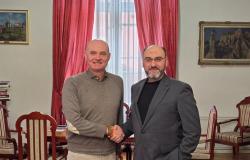At the UNSA Faculty of Political Sciences, the book “Non-Institutional Politics: Institutions and New Political Actors” by Prof. Dr. Elvis Fejzić

At the University of Sarajevo Faculty of Political Sciences, the promotion of a book “Non-Institutional Politics: Institutions and New Political Actors“ by Prof. Dr. Elvis Fejzic took place. About the book spoke: Prof. Dr. Elmir Sadiković, who also read a book review by the recently deceased professor emeritus Esad Zgodić, and Prof. Dr. Sead Turčalo. The promotion was moderated by several of the best students of the master's program “Public Administration” and this year's UNSA gold and silver badges recipients: Ilma Garankić, Damir Mahmutović, Lejla Burgić and Belmin Delić.
The book’s central theme is the contrast between institutional politics, characterized by traditional state and bureaucratic frameworks and non-institutional politics, which includes the activities of civil society organizations, social movements and economic associations. Fejzić articulates the view that, although extra-institutional politics often lacks democratic potential and can threaten the effectiveness of institutional politics, it also represents a key aspect of the democratic process.
The book provides a comprehensive theoretical analysis in various areas of political science, such as political theory, state models, theories of globalization and political psychology, emphasizing the importance of understanding the different but interrelated roles of both institutional and non-institutional actors in shaping political programs and decision-making processes.
The political context of the work is framed by the ideologies of anarchism, liberalism and constitutionalism, contrasting them with the emergence of non-institutional political actors. The analysis of civic strategies in non-institutional politics is particularly significant, which highlights the correlation and manipulation between state power and citizens.
An outstanding feature of Fejzić's work is the synthesis and research of alternatives such as antipolitics, agonism and alterpolitics, which are key to understanding the current and future trajectory of political discourse and action, especially in the context of a turbo-globalized world.
Fejzić's book is not only a theoretical research but also a critical analysis of different concepts of political power, the sovereign role of people in democratic regimes and the corresponding ideological worldviews, serving as a vital resource for understanding the complex and layered political process in democratic states.
This book is a valuable contribution to the field of political science, offering a nuanced understanding of the complexities and interdependencies in modern democratic systems. It challenges readers to consider the nature of political power and participation in development in an age of globalization and offers insightful perspectives on the future trajectory of democratic governance.













